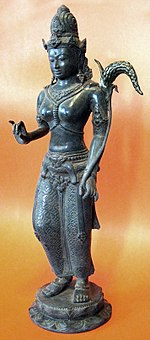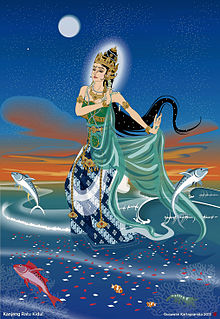User:HouseGecko/Traditional religions of Indonesia
| This is not a Wikipedia article: It is an individual user's work-in-progress page, and may be incomplete and/or unreliable. For guidance on developing this draft, see Wikipedia:So you made a userspace draft. Find sources: Google (books · news · scholar · free images · WP refs) · FENS · JSTOR · TWL |
Traditional religions of Indonesia (Agama Asli Nusantara) are the ethnic religious beliefs of the many ethnicities of Indonesia, which may have or may have not been influenced by foreign religions such as Hinduism, Christianity and Islam.
Prior to the arrival of the Abrahamic religions, many Indonesians adhered the religions of Buddhism and Hinduism as a result of Indianization. However, despite this, many Indonesian ethnic religions are relatively free from foreign influences. Today, aspects of traditional religions survive in the form of folk myths, such as the myth of Nyai Roro Kidul, as well as Dewi Sri, whose name itself translates to "Goddess Sri". These myths are collected into the bodies of Indonesian mythology and folklore.
Aspects of Indonesian traditional religions[edit]
Animism[edit]
Animism is centered on the belief that all objects, creatures and places possess a spiritual essence.
Polytheism[edit]
Pantheism[edit]
By geography and ethnicity[edit]
Sumatra[edit]
- Batak - Traditional Batak religion. Today Parmalim.
- Karo - Pemena
Java[edit]
- Betawi - Ondel-ondel, a traditional dance with large puppets, was once traditionally performed as a defensive act to against calamities, evil spirits, and diseases.[1] These puppets are believed to hold divine power,[1] although today the dance is usually performed during festivals and welcoming guests.

Dewi Sri, the rice goddess of Java and Bali, Central Java art.
- Javanese - Javanese religion, popularly known as Kejawen or Kebatinan. They also believe in the legend of Nyai Roro Kidul, the sea goddess who resides in the South Sea, and is dubbed "the Queen of the South Sea".
- Sundanese - Sunda Wiwitan is the name of the traditional Sundanese religion. They worship a supreme god, Sang Hyang Kersa, along with many other divinities such as the rice goddess Nyai Pohaci Sanghyang Asri (also known as Dewi Sri), the mother goddess Sunan Ambu, and various Hindu gods such as the Trimurti (Brahma, Vishnu, and Shiva). Seren Taun is the rice harvest festival dedicated to Dewi Sri. Like the Javanese, the Sundanese also believe in the legend of Nyai Roro Kidul, and that the oldest manuscript that references this legend dates back to the Sunda Kingdom times, although anthropological studies suggest the myth originated from prehistoric animism.

Bali[edit]
The Balinese religion and mythology includes the fight between Barong and Rangda. Today, the Balinese practice Balinese Hinduism, a form of Hinduism syncretized with local beliefs.
Kalimantan[edit]
- Dayak
Sulawesi[edit]
- Minahasa
- Toraja
Maluku[edit]
Indonesian traditional religions today[edit]
Many traditional religions of Indonesia are still unrecognized,[2] as the first principle of Pancasila is "Belief in the one and only God", and that many traditional religions incorporate animism and polytheism. That being said, many adherents of traditional religions are registered as "Hindus", an example are the Dayaks, whose religion Kaharingan is often referred as "Kaharingan Hinduism".[3]
References[edit]
- ^ a b Liputan6.com. "Menguak Mistis di Balik Ondel-Ondel Betawi". liputan6.com. Retrieved 2017-12-08.
{{cite news}}: CS1 maint: numeric names: authors list (link) - ^ Matanasi, Petrik. "Agama-agama Yang Dipinggirkan". tirto.id (in Indonesian). Retrieved 2017-12-13.
- ^ "Mengenal Lebih Dalam Kaharingan, Agama Suku Dayak yang Sudah Ada Sejak Ratusan Tahun Lalu". Boombastis.com (in Indonesian). Retrieved 2017-12-10.
External links[edit]


